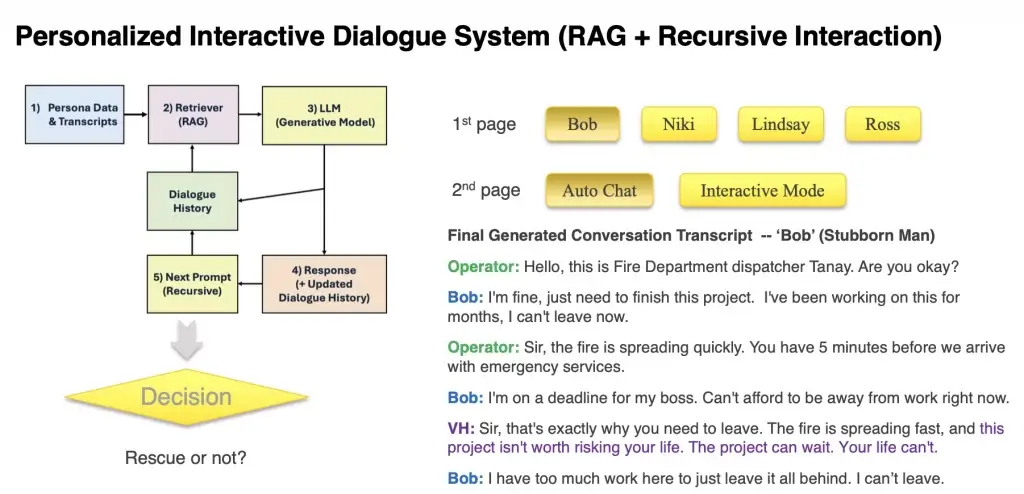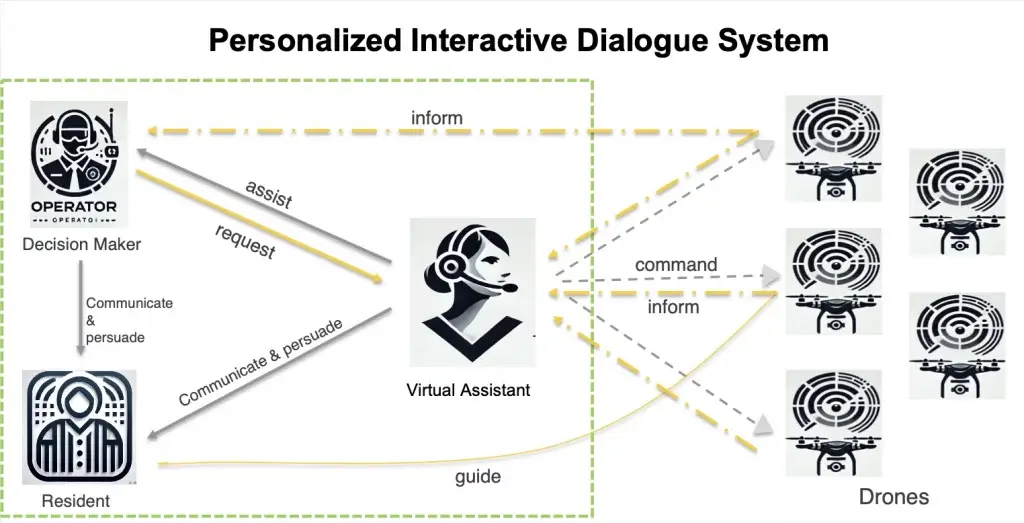ICT is running a series of articles to highlight the work of our Graduate Research Assistants. In this essay we hear from Tianyi (Mavis) Zhang, PhD student, Computer Science, Viterbi School of Engineering, who works as a Research Assistant in ICT’s Dialogue Group, under the supervision of Dr. David Traum, Director for Natural Language Research.
BYLINE: Tianyi (Mavis) Zhang, PhD student, Computer Science, Viterbi School of Engineering; Research Assistant, Dialogue Group (Natural Language Research), USC Institute for Creative Technologies
Language has always fascinated me. The way we communicate, persuade, and understand one another is a deeply human trait—one that artificial intelligence is just beginning to grasp. My research focuses on advancing Natural Language Processing (NLP), particularly in dialogue systems that make AI interactions more personalized, coherent, and engaging. But my path into this field was not a straight one.
I initially pursued an undergraduate degree in accounting at Rutgers University. However, I soon realized that my true interest lay elsewhere. Accounting, with its rigid structure, felt too constrained, while statistics provided a sense of discovery—an opportunity to uncover patterns and insights hidden within data.
This realization led me to Fordham University, where I transitioned to Data Science. It was there that I first encountered artificial intelligence, specifically through machine learning and deep learning models. My focus at the time was Educational Data Mining, a field dedicated to understanding how students learn.
Yet, despite my fascination with AI, I was not ready to commit to a PhD just yet. I hadn’t found my true research passion.
Engaging with Natural Language Processing (NLP)
Then, while working as a Data Scientist at a startup in Beijing, I began to use NLP tools to analyze public sentiment on social media and was intrigued by how machines could process and interpret human language.
This curiosity deepened when I joined an AI research institute’s text-to-speech team, where I helped develop AI-generated audiobooks—enabling machines to read books aloud with natural intonation.
By then, my interest in NLP was set, and I knew I wanted to push the boundaries of AI-generated communication. This led me to apply for PhD programs, and the USC Institute for Creative Technologies (ICT) stood out to me due to its cutting-edge research in virtual humans, dialogue systems, and interactive AI.
Research Work at ICT
Now, as a PhD student at the Viterbi School of Engineering, I work in ICT’s Dialogue Group under the supervision of Dr. David Traum, Director for Natural Language Research, focusing on Personalized Dialogue Generation.
My goal is to create AI-driven conversational agents that go beyond generic responses—systems that understand and adapt to the unique traits, emotions, and knowledge of the individuals they interact with.
One of my current projects involves Retrieval-Augmented Generation (RAG) for personalized dialogue systems. By integrating persona-aware retrieval mechanisms with large language models (LLMs), I aim to enhance coherence and engagement in AI conversations.

My research also incorporates reinforcement learning techniques to optimize dialogue retrieval and generation, ensuring that AI systems can sustain meaningful, context-aware discussions.
Beyond theoretical advancements, my work extends to real-world applications. A major project I am contributing to is the Human Swarm Interaction system for fire rescue. This initiative involves coordinating a Virtual Agent, a human Operator, drones, and townspeople to facilitate rapid evacuations.

My role is to develop an intelligent dialogue system that minimizes the Operator’s cognitive load while maximizing the effectiveness of emergency communication. Given that different individuals respond differently under stress, the system must tailor its persuasion strategies to each townsperson’s personality, emotions, and knowledge gaps. Through iterative refinement and real-time feedback mechanisms, I strive to make these interactions as natural and efficient as possible.
Future Plans in NLP
Research is often an iterative journey of discovery, filled with both challenges and breakthroughs. As I look ahead, I hope to contribute meaningful advancements to NLP and AI-driven communication.
As I build on my current research, I look forward to engaging with the wider research community and exploring new directions in NLP.
From statistical exploration to AI-powered dialogue, my journey has been shaped by an ever-deepening curiosity about how machines understand and generate language. I believe that by making AI-driven conversations more personalized and effective, we are taking one step closer to a future where technology truly understands us—not just as users, but as individuals.
//
